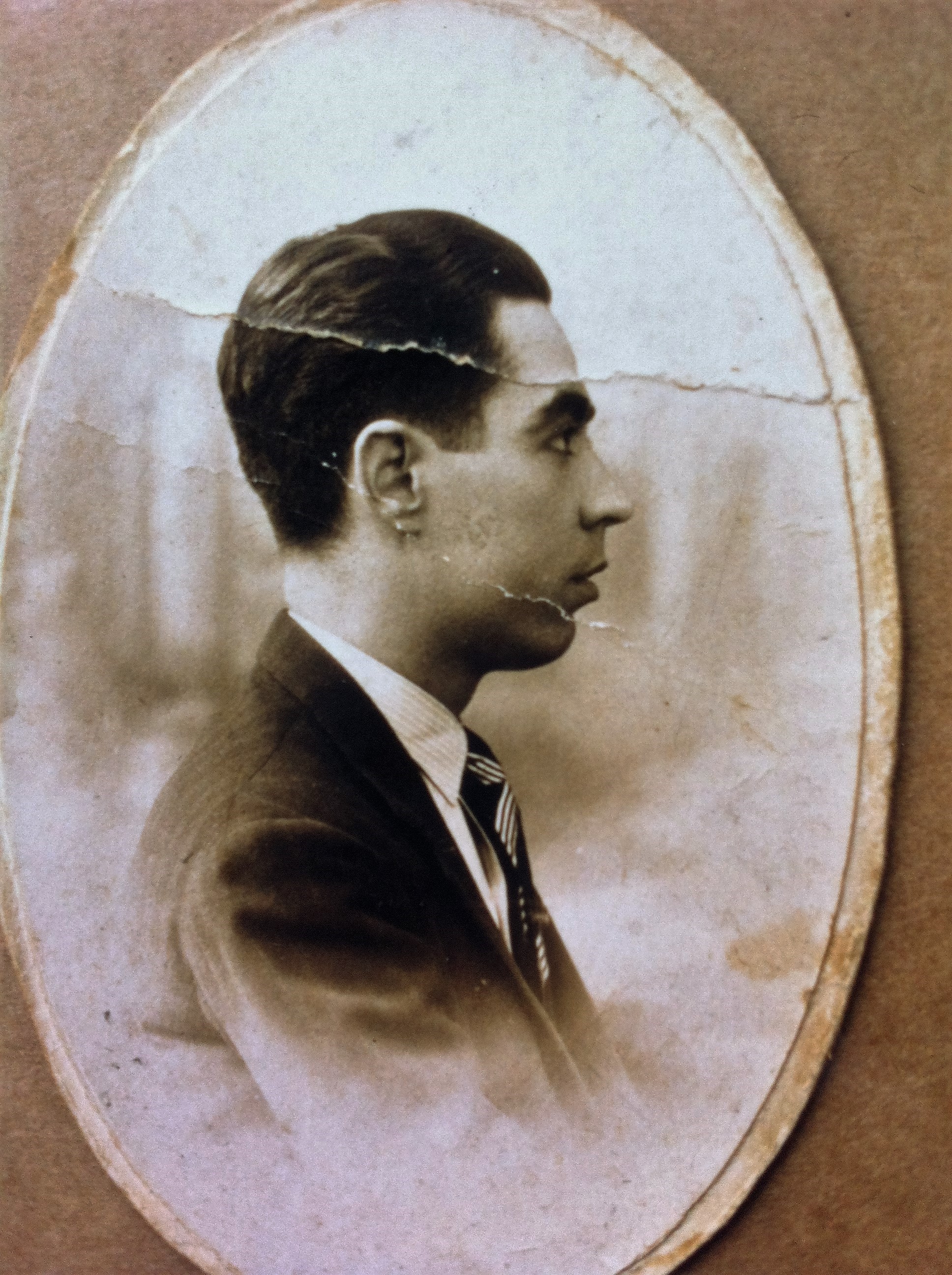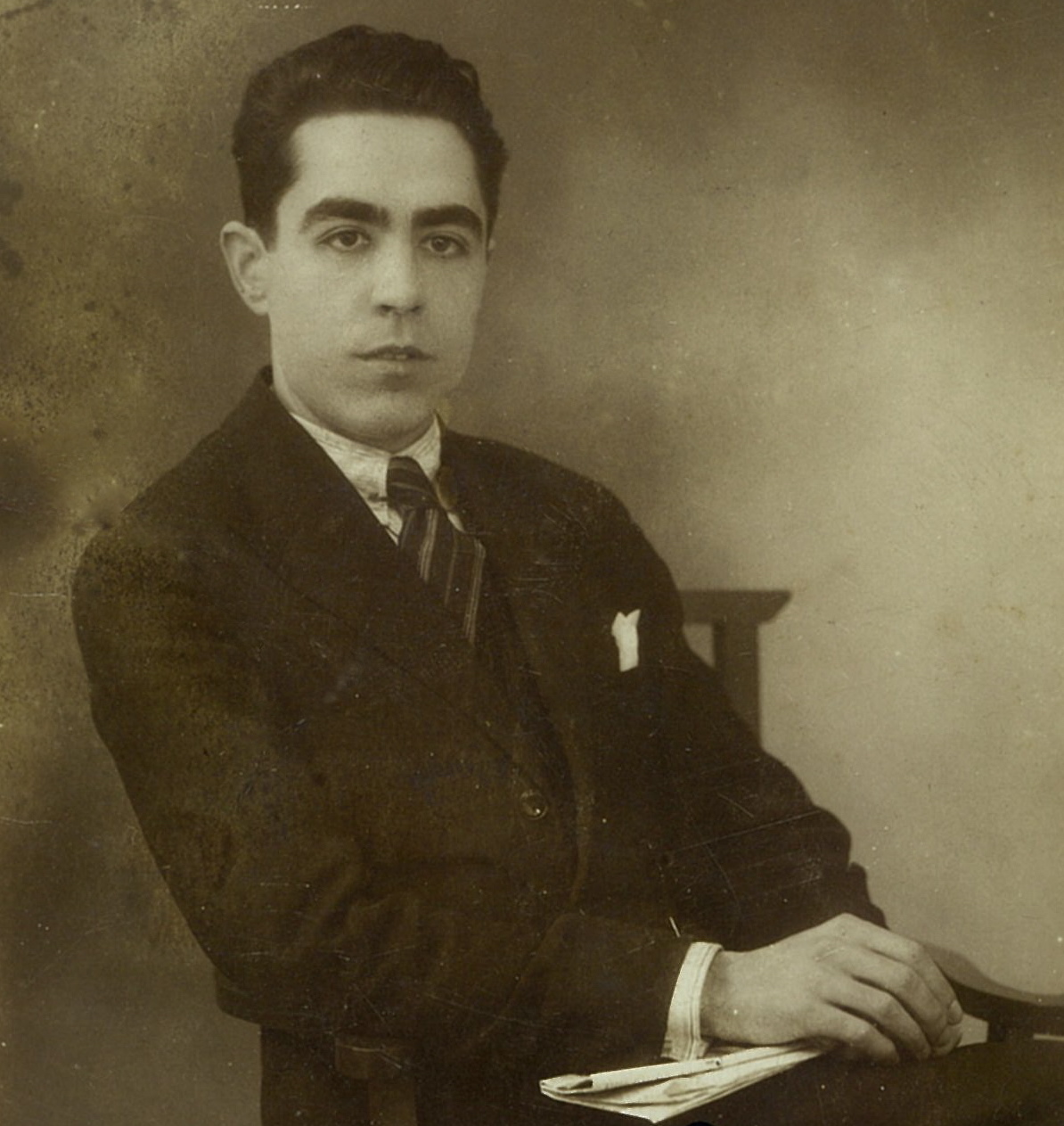José Ponce Bernal
José Ponce began his journalistic career at the newspaper La Provincia, a nightly publication, serving as a sports columnist between 1917 and 1920, where he gained recognition under the pseudonym Blanqui-Azul. He later worked as a social columnist between 1921 and 1922. During these years, he became involved in the associative and union movement in Huelva. He served as secretary and vice president of Huelva Fútbol Club in 1919, secretary of the Writers' Union in 1920, and secretary of the Local Workers' Federation in 1922. He also contributed to other newspapers such as Madrid Sport, La Rábida, Revista Colombina Iberoamericana, or El Defensor, where he was part of the editorial team in 1926, the year the Federation of the Press of Spain issued his journalist card. On January 1, 1927, Diario de Huelva, the leading morning newspaper of the time, welcomed him as a writer, and in August, he was appointed chief editor, a position he held until October 1933. Professionally, he was a member of the Huelva Press Association, first as vice president (1928-30) and later as a board member (1931-33). In 1928, he was also listed as a member of the Huelva Masonic lodge Cañavate, with the symbolic name Bakunin, although his time in Freemasonry was short-lived and limited to this brief period.
His political activity coincided with the proclamation of the Second Republic. He decided to take political action and get involved. In June 1931, he was elected president of the Republican Democratic Federal Party (PRDF) of Huelva (in June of that year, he was elected regional vice president). During those years, he also contributed to other newspapers: El Defensor, El Nuevo Régimen (PRDF's organ), and El Fraternal (UGT and PSOE's organ). He ran in the general elections of 1933 but did not garner enough support in the first round to continue his career to reach the Cortes. The socialists were calling for unity with other left-wing forces to go together to the second round, a position he supported and the party committee endorsed. However, the assembly decided to allow the membership to vote freely, and José Ponce, in coherence with his views and those of his local leadership, submitted his irrevocable resignation feeling discredited.
Diario de Huelva expelled him from the newspaper for political reasons just before those elections. A generalized decline began in the character's life, with his journalistic career and political aspirations thwarted. On October 9, 1934, after the social upheaval in the mining areas, he was arrested in Huelva for being considered an accomplice for leaving the keys to his house to the supposed ringleader, Socialist deputy Crescenciano Bilbao. From his residence, the general strike and the revolutionary movement were organized, taking place in the capital and the province. The legal case (33/934), which was conducted against about thirty people, ended up in the Supreme Court due to Bilbao's protected status. On April 26, 1935, provisional freedom was granted, and he requested that his residence be established in Madrid. The case was dismissed, and the detainees were released when amnesty was granted for all political prisoners after the triumph in February 1936 of the Popular Front.
In September 1935, he was an editor for the Madrid graphic newspaper Ahora, as he stated in another legal case (12,092) opened against him in Almería at the end of the war. A report from the Civil Guard filed in that case assures that ten months before July 1936, he belonged to its editorial team. Although we have not been able to find his signature in the prestigious newspaper, we do have a business card reflecting this correspondence. According to his own testimony, in Madrid, he also held the official representation of the Provincial Council of Huelva during these dates, information that we have not confirmed.
The war caught him in Madrid. His wife and four children stayed in Huelva, where he would never return. He joined the PSOE, joined the Professional Association of Journalists, and the Madrid Socialist Association; later, in the Spanish Graphic Federation, Madrid Journalists section. He started writing for the newspaper Claridad, the organ of the UGT and the left-wing of the PSOE. In 1936, he was on the payroll of the Columna España, of the CNT. On August 20, 1936, Claridad published his first article signed as a war correspondent on the Southern Front, in the areas of Córdoba and Jaén, where he would stay - residing in Andújar - until April 1938.

In November 1937, he had unconditionally offered to take a position in the Commissariat, as stated in a letter sent to Luis Cillán, a command stationed in Valencia. On March 9, 1938, his appointment as Battalion Commissioner was published in the Official Gazette of the Ministry of Defense. Claridad echoed this and affectionately bid him farewell in its edition of March 17. He joined the Battalion of Stages 5 in Ciudad Real. His journalistic work would continue in the newspaper Avance, the organ of the PSOE and the UGT in this province, where he would publish articles signed with his full name on the front page from June to September 1938.
After the war, he was arrested on March 30 in Viator (Almería) and admitted to the Provincial Prison Ingenio (Case 12,092). Correspondence with his family was initiated, which is preserved. It consists of a set of 42 postcards and letters of great beauty and enormous documentary interest. In May 1940, his freedom was granted as his file could not be found. His residence was established in Madrid, where he was arrested again on June 5, in a tailor shop, along with 18 other people, all accused of clandestine meetings and aiding the rebellion (legal case, summary proceeding 67,773/108,887, from Military Court). He was admitted to Las Comendadoras, a convent converted into a prison. From there, he wrote to his family, dated August 15, 1940, the last postcard. He died on September 5 at the Provincial Hospital of Madrid as a result of the torture he underwent during interrogations, although the official version pointed to a "brain tumor" as the cause of his death.
In 1944, the Special Tribunal for the Repression of Freemasonry and Communism issued a new arrest warrant against him. The case (Summary 20-45) was dismissed in July 1945, and the legal proceedings were archived upon learning of his deceased status.
His thought
The trajectory of José Ponce Bernal shows us a man with a restless spirit who stood out in the society of his time. He wanted to be a protagonist, to lead the moment, to impose his character, his vision of life, decisively and with charisma. Undoubtedly, he influenced the thinking of his contemporaries. To achieve this, he used journalism and, as was common at the time, he intertwined journalism with politics. He understood that, in the end, it was the only way to change the state of things. Journalism and politics were the only instruments capable of ending social inequality, extreme poverty, and the oppressive patronage system imposed in the province very forcefully throughout the Restoration and the Primo de Rivera Dictatorship, which continued to hold significant power even during the Second Republic. He managed to position himself in Huelva's society in such a way that he quickly gained respect and became, as we have seen, a leader in trade unions, politics, corporations, and the professional sphere. He was an intellectual committed to the society he lived in, during a tumultuous social and political moment. His affiliation with leftist ideologies led him to a tragic end after the Spanish Civil War.
His professional life is divided into three well-defined stages, coinciding in time with three decisive historical periods: the sports columnist during the Restoration and the beginning of Primo de Rivera's dictatorship; the social and political columnist during the dictator's downfall, the Berenguer period, and the Second Republic; and finally, the war correspondent and political analyst during the Spanish Civil War.

The chronicle was José Ponce Bernal's preferred genre. From his early days at the Huelva newspaper La Provincia to his final writings, he delighted us with his engaging storytelling, blending news and current affairs with opinion and analysis. José Ponce presented, explained, reasoned, and ultimately stated what needed to be done, criticizing what had not been done.
His primary concern was for children, the helpless, and the homeless. He praised those who dedicated their lives to alleviate this situation and strongly criticized the selfishness, greed, and imposition exercised by local bosses over workers and society as a whole. Obsessed with education and culture, Blanqui-Azul advocated for schools for poor children, playgrounds where they could play in the shade, assistance for families to live in dignified conditions, and employment for the thousands of unemployed, a number that multiplied with the 1929 crisis that wreaked havoc in Huelva from 1930 onwards.
Our author was shaped in an environment of change in the thinking and attitudes of Spanish society, led by the men and women of the Generation of '14: Ortega, Azaña, Giner de los Ríos, Ramiro and María de Maeztu, Zenobia Camprubí, Campoamor, Marañón, and others. He grew alongside those of the Generation of '27: Lorca, Alberti, Ayala, Chacel, Cernuda...
From a province distant from that cultural and political axis, the young journalist shaped opinions through newspaper pages and spearheaded initiatives as significant for culture as the launch of the Popular Athenaeum of Huelva. He promoted campaigns in favor of establishing schools and praised literary figures like Benavente or Mariano de Cavia, as well as pedagogical figures like Luis Bello. He published propaganda pamphlets of high literary and artistic quality, such as the one at hand.
Ponce saw and interpreted Huelva's problem as the Generation of '14 saw and interpreted the problem of Spain. The lack of culture led to frustration, which in turn incapacitated the region from keeping pace with the rest of Spain, and Spain from keeping pace with Europe. He called for capable, intelligent, and cultured leaders to wisely manage resources. He demanded that people be industrious and enterprising to create public wealth and general progress. He lamented the lack of initiative, believing that laziness and discontent were intrinsic defects of human nature, particularly in the Spanish character and even more pronounced in the profile of the people from Huelva. The inaction of public authorities in the face of societal issues such as poverty and misery, along with culture and education, formed the basis of his advocacy. He sought consensus, unity, and action. Innovation, transformation, the creation of values, and commitment were essential.
Journalists, seen by him as men of understanding, had, from his perspective, a tremendous responsibility in the task of education. He viewed his profession as an ideal complement because, through the pages of a newspaper, thinking was guided, and opinion was formed. Aware of this, he used this lever to influence, much like many writers of the Generation of '98 and most members of the Generation of '14, who used newspapers and magazines to disseminate their theories and defend their ideas.
